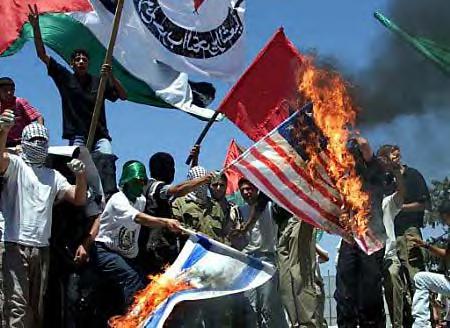
Nikki Haley told the Security Council that Hamas, backed by Iran, had incited the violence by urging protesters over loudspeakers to burst through the fence separating the borders and flying kites into Israel with molotov cocktails attached.
"I ask my colleagues here in the Security Council: Who among us would accept this type of activity on your border?" Haley said. "No one would. No country in this chamber would act with more restraint than Israel has."
The emergency meeting of the Security Council was called by Kuwait to discuss the unrest at Israel's border with Gaza that has killed at least 60 Palestinians and left thousands wounded after Israeli soldiers and snipers fired into a surging crowd of demonstrators Monday. It was the deadliest day for Gaza in years and came amid celebrations of a U.S. mission in Jerusalem being officially converted into an embassy.
The debate underscored the gulf between the United States and Israel on one side and most other countries on the other in their assessments of six weeks of escalating tensions at the Gaza border about 40 miles from Jerusalem.
From U.S. allies to adversaries, most ambassadors added their opposition to the U.S. Embassy move to their remarks on the violence.
"The unilateral decision by the United States to move its embassy to Jerusalem does nothing but inflame spirits," said Sacha Llorenti, Bolivia's envoy. "The United States, which supports the occupying power, has become an obstacle to peace. It has become part of the problem, not part of the solution."
Karen Pierce, the British ambassador, expressed support for an investigation into Monday's killings, then stated London's position on the U.S. Embassy's opening.
"Our position on the status of Jerusalem and moving the American embassy is well known," she said. "The status of Jerusalem should be determined in a negotiated settlement between Israel and Palestinians, and Jerusalem should ultimately be the shared capital of the Israeli and Palestinian states."
The envoys from China, Sweden and the Netherlands also went out of their way to reiterate their government's position that Jerusalem's status should be left to negotiations and their intention to keep their embassies in Tel Aviv.
Riyad Mansour, the Palestinian representative at the United Nations, said the embassy opening had violated international law and Security Council resolutions.
"No one has the right to imperil our territory and place an embassy in a territory under occupation," he said.
Haley, speaking at the beginning of the session, said the location of the U.S. Embassy has no bearing on whatever Israelis and Palestinians might negotiate and described the opening of the facility as "a cause for celebration."
"It reflects the will of the American people," she said. "It reflects our sovereign right to decide the location of our embassy. Importantly, moving our embassy to Jerusalem also reflects the reality that Jerusalem is the capital of Israel. . . . Recognizing this reality makes real peace more achievable, not less."
Haley and Danny Danon, Israel's U.N. ambassador, accused Iran of helping foment the violent and deadly clashes along the border with Gaza.
"We do have indications of Iranian funding into Hamas," said Danon, talking to reporters before the Security Council meeting.
"We know the riots are well organized, well funded and well orchestrated by Hamas," he added. "Iran is supporting the riots in Gaza."
But the main focus of the debate was the violence at the Israeli-Gaza border. Many ambassadors recognized Israel's right to defend itself and denounced Hamas for encouraging protesters to storm the gate.
All, however, said Israel bears a responsibility to keep its response proportionate and not use live ammunition on civilians.
Lethal force should be exercised with restraint," said Olof Skoog, Sweden's representative.
Mansour al-Otaibi, the Kuwaiti ambassador to the United Nations, said he would circulate another draft resolution Wednesday calling for the United Nations to provide protection for civilians in Gaza. He said it would be short of a peacekeeping force, however.
Francois Delattre, the French ambassador, said the violence threatens to engulf the region.
"The situation in the Middle East is close to a perfect storm," he said. "What is happening in Gaza only reinforces radical and potentially terrorist organizations in the region."
Washington and Jerusalem have blamed the violence squarely on Hamas. The White House has refrained from calling for Israel to exercise restraint, and it characterized the use of live ammunition on the protesters an act of self-defense.
Danon lambasted Hamas, saying it "values destruction over prosperity, death over peace," and had willingly placed its own people in the line of fire to score propaganda points.
He asked the members of the Security Council to put themselves in Israel's shoes.
"What would you do, each one of you, if a violent mob of tens of thousands were threatening your sovereign borders?" he said. "What would you do if your people were faced with terror attacks day in and day out? You must not give in to the cycle of death the Palestinians have created. You must call out lies when you see them."
But the actions of Israeli troops, and the U.S. refusal to even express regret for the loss of life, has left both countries isolated amid growing condemnations that Israel used excessive force against the protesters, many of whom were unarmed.
A U.N. human rights official on Tuesday called for an independent probe of more than 100 deaths and thousands of injuries since March 30.
"We urge maximum restraint. . . . Enough is enough," Rupert Colville, spokesman for U.N. Office of the High Commissioner for Human Rights, told reporters in Geneva. Colville said that lethal force should be "a measure of last - not first - resort."


 Contact The Editor
Contact The Editor
 Articles By This Author
Articles By This Author